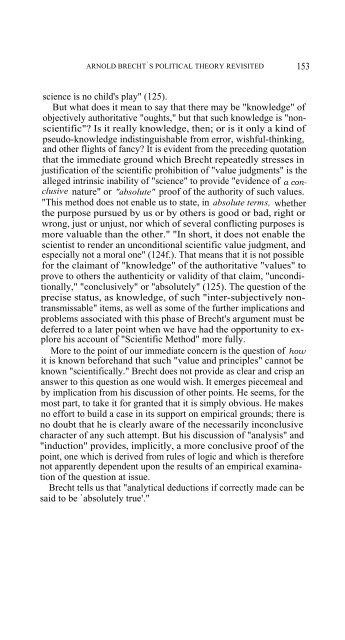ARNOLD BRECHT'S POLITICAL THEORY REVISITED Political ...
ARNOLD BRECHT'S POLITICAL THEORY REVISITED Political ...
ARNOLD BRECHT'S POLITICAL THEORY REVISITED Political ...
You also want an ePaper? Increase the reach of your titles
YUMPU automatically turns print PDFs into web optimized ePapers that Google loves.
<strong>ARNOLD</strong> BRECHT ' S <strong>POLITICAL</strong> <strong>THEORY</strong> <strong>REVISITED</strong> 153<br />
science is no child's play" (125).<br />
But what does it mean to say that there may be "knowledge" of<br />
objectively authoritative "oughts," but that such knowledge is "nonscientific"?<br />
Is it really knowledge, then; or is it only a kind of<br />
pseudo-knowledge indistinguishable from error, wishful-thinking,<br />
and other flights of fancy? It is evident from the preceding quotation<br />
that the immediate ground which Brecht repeatedly stresses in<br />
justification of the scientific prohibition of "value judgments" is the<br />
alleged intrinsic inability of "science" to provide "evidence of a conclusive<br />
nature" or "absolute" proof of the authority of such values.<br />
"This method does not enable us to state, in absolute terms, whether<br />
the purpose pursued by us or by others is good or bad, right or<br />
wrong, just or unjust, nor which of several conflicting purposes is<br />
more valuable than the other." "In short, it does not enable the<br />
scientist to render an unconditional scientific value judgment, and<br />
especially not a moral one" (124f.). That means that it is not possible<br />
for the claimant of "knowledge" of the authoritative "values" to<br />
prove to others the authenticity or validity of that claim, "unconditionally,"<br />
"conclusively" or "absolutely" (125). The question of the<br />
precise status, as knowledge, of such "inter-subjectively nontransmissable"<br />
items, as well as some of the further implications and<br />
problems associated with this phase of Brecht's argument must be<br />
deferred to a later point when we have had the opportunity to explore<br />
his account of "Scientific Method" more fully.<br />
More to the point of our immediate concern is the question of how<br />
it is known beforehand that such "value and principles" cannot be<br />
known "scientifically." Brecht does not provide as clear and crisp an<br />
answer to this question as one would wish. It emerges piecemeal and<br />
by implication from his discussion of other points. He seems, for the<br />
most part, to take it for granted that it is simply obvious. He makes<br />
no effort to build a case in its support on empirical grounds; there is<br />
no doubt that he is clearly aware of the necessarily inconclusive<br />
character of any such attempt. But his discussion of "analysis" and<br />
"induction" provides, implicitly, a more conclusive proof of the<br />
point, one which is derived from rules of logic and which is therefore<br />
not apparently dependent upon the results of an empirical examination<br />
of the question at issue.<br />
Brecht tells us that "analytical deductions if correctly made can be<br />
said to be `absolutely true'."
















